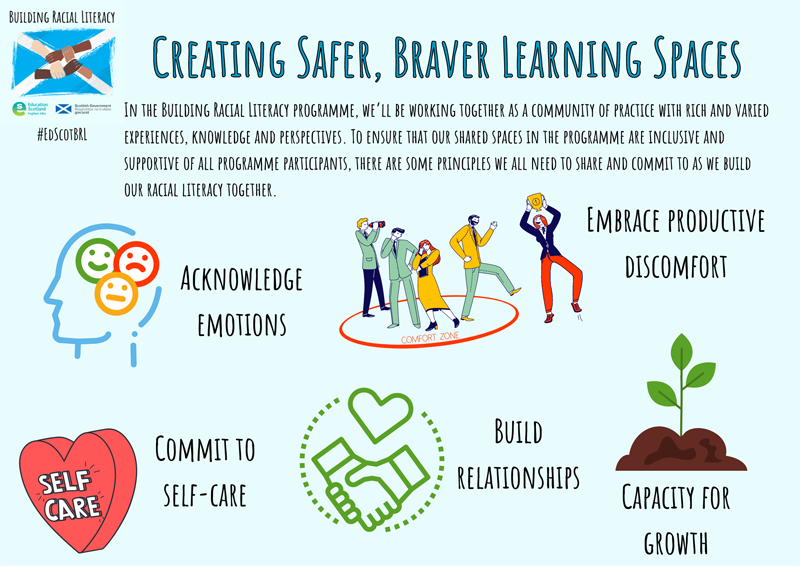Towards safer, braver spaces for online learning

On the Building Racial Literacy programme, we’ll be working together as a community of practice with rich and varied experiences, knowledge and perspectives.
To ensure that our shared spaces in the programme are inclusive and supportive of all programme participants, there are some principles we all need to share and commit to as we build our racial literacy together.
Acknowledge emotions
Conversations about race can be emotional, and how people feel will vary from person to person. What’s mildly uncomfortable for one person could feel very distressing for another. For Black people and people of colour, this distress is known as racial trauma.
It’s important that we pay attention to our own and others’ emotions. When we connect with our emotions and approach anti-racism with our heart, not just our brains, we will be better equipped and motivated for anti-racist action.
Embrace Productive Discomfort
The conversations we have will inevitably feel uncomfortable at times. Don’t feel put off by this, particularly if you’re from a white majority ethnic background. Learning is more effective when we step outside our comfort zone.
Reflecting on why you’re feeling uncomfortable helps with self-awareness and shows your racial literacy is starting to grow. To make the most of this opportunity to learn, take a note of your discomfort and your reflections on it in your personal reflective journal.
Commit to Self-Care
When we begin to experience unhealthy amounts of discomfort, it’s important to step back. Discomfort is no longer productive when it becomes distress. On this programme, it’s important that we look after ourselves as well as each other. Take time to consider what you need in order to relax, stay motivated and think positive.
You will best placed to know what’s needed. However, if at any point the programme becomes too overwhelming to cope with, get in touch with your Programme Lead and Compassion Captain for support.
Build Relationships
The Building Racial Literacy programme has different learning groups and support networks created according to geographical region, professional affinity and racial-ethnic identity. You will have at three groups to rely on as support networks during the programme, and we hope you’ll maintain those networks after the programme.
You can rely on your fellow participants in these groups for support if you feel uncomfortable or isolated. A lot of the time, they will be going through similar experiences. We can all support each other by being kind, patient and understanding.
This includes being kind to ourselves, so if supporting fellow participants becomes too stressful, you might need to step back, and understand when others need to step back. As stated earlier, conversations about race are emotional, so looking after each other is important.
Finally, make sure to inform your Programme Lead and Compassion Captain if you notice that a peer is experiencing unhealthy amounts of distress that your group can’t support.
Capacity for Growth
In this programme, we are all learners; learning from, with and on behalf of each other. We collectively need to adopt a growth mindset, understanding that racial dialogue and anti-racism are complex skills that can be learned over time. As in every learning process, we need to be brave enough to practise and make mistakes before we can see progress. This can require a good deal of vulnerability, humility and kindness towards ourselves as we commit to improving over time.
We encourage you to always assume good intentions, avoid making moral judgements and be as constructive when engaging with your fellow participants. We are less likely to adopt a growth mindset if we feel that we are seen as an inherently “racist” and bad person; we are much more inclined to learn when we feel we are working together to grow and change so that our collective behaviours and practices can become less harmful.
These five principles are adapted from Mélina Valdelièvre’s Framework for Mutual and Productive Communication about Race in Education (PDF).
